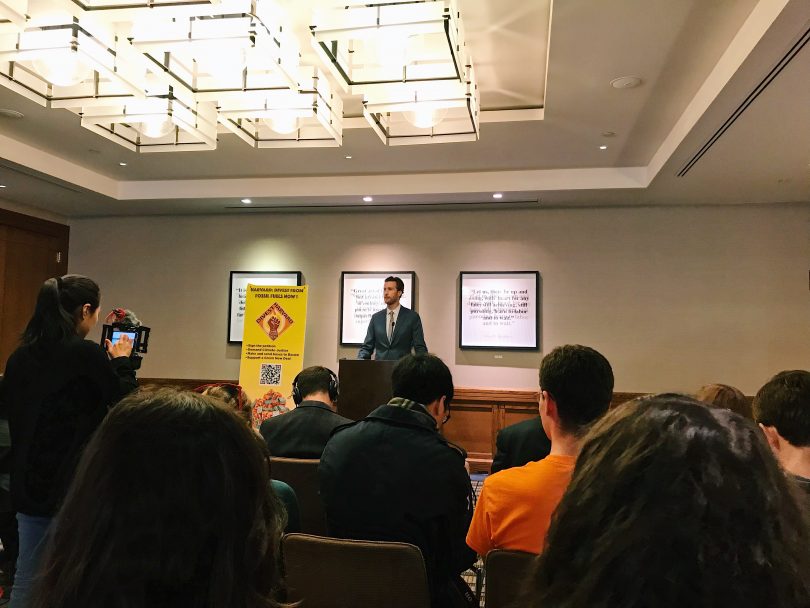By Martha Merrow
BU News Service
CAMBRIDGE – Members of the Harvard community gathered on Earth Day to call upon the university to divest from fossil fuels, eliminating gas and oil companies from its nearly $40 billion-dollar endowment.
“We believe it is morally unjustifiable to invest in fossil fuels at the heart of the climate crisis,” said Divest Harvard student organizer, Ilana Cohen, Harvard ‘22. “We fight because we reject the hypocrisy of a university that refuses to align its financial principles with its ethical ones.”
The student organization, Harvard Undergraduates for Environmental Justice, asks Harvard to issue a commitment to divest by Earth Day of 2020, Cohen said.
Nearly 50 students, faculty and alumni gathered at the Charles Hotel on Monday for a press conference held by Divest Harvard. The organization is fighting to uphold its university to the same leadership standards it expects of its students, Cohen said.
“Fossil fuels have been the energy that we have used since hominids came on this earth, but we do not need to be Neanderthals in terms of understanding what we need to do moving forward,” said former EPA Administrator Gina McCarthy and professor at the Harvard T.H. Chan School of Public Health. “So let’s invest where our health is. Let’s invest where justice belongs. Let’s invest in the future, not the past.”
McCarthy said she first came to the university because of its global commitment to science. Now, she urges the university to respect that commitment and cut its ties with the fossil fuel industry.
“Put Harvard’s money where it belongs: in the future, not in the past. In clean energy, not fossil fuels,” McCarthy said.
Timothy Wirth, Harvard ‘61, former United States senator, expressed concern for the industry’s increasingly sophisticated tactics of deceiving Americans and discrediting scientists.
“The insidious tentacles of the fossil fuel industry are reaching more broadly than they ever have before,” Wirth said. “Those have got to be exposed, and one of the ways of doing that is for Harvard to say that it is no longer going to invest in future sources of fossil fuels.”
Craig Altemose, Harvard ‘10, Executive Director of the Better Future Project, was part of the student initiative 10 years ago to transition Harvard’s buildings and grounds towards sustainability, adopting green standards, he said.

Altemose expressed his disappointment in the current university administration. “To see how much this institution has dragged its feet, over a much bigger question of Harvard’s financial footprint, has been really disheartening as a Harvard alumni to witness.”
The university refused a similar demand to divest from fossil fuels back in 2013. But Cohen assured that this time would be different.
“The political moment is different right now,” Cohen said. “There is a clear and palpable need for climate action, and we are making that heard.” The student organization has also recognized the importance standing in solidarity with other student movements across campus, including the Harvard Prison Divestment Campaign, Cohen said.
Yet Harvard maintains its same stance of 2013, according to a written statement obtained by WGBH.
“The University’s position, as it has stated previously, is that it should not use the endowment to achieve political ends, or particular policy ends,” Harvard spokesman Jonathan Swain said in a written statement Monday. “There are other ways the University works to influence public policy, including through scholarship and research.”
Should Harvard divest from fossil fuels, this wouldn’t be the first time the university divested for social causes, as Harvard Professor James Engell noted.
“Harvard divested four times in the last 40 years,” Engell said. “Once from companies wholly owned by South African firms, once from firms doing business in South Africa, once from big tobacco and once from companies complicit in violating human rights in Darfur.”
Engell then reminded Harvard of the true duty of its endowment. “An endowment may serve the president, but its deeper purpose has always been to underwrite future generations,” he said.
Justin Rockefeller spoke as an example of successful divestment. For decades, Rockefeller said, members of his family served as activist shareholders on the Rockefeller Brothers Fund, trying to change the behavior of fossil fueled companies that had emerged out of Standard Oil.
When it became clear the family’s efforts would not enact change, the fund chose to divest, he said. Five years later, and the foundation continues to meet its benchmark, according to Rockefeller.
“So this can be done. We are doing it. Harvard can do this too,” Rockefeller said.
Reflecting on Harvard’s divestment history, Altemose said that the university has failed to be a leader in enacting change, specifically when it was one of the last universities to divest from companies entangled in the South African apartheid.
“When Nelson Mandela came to Massachusetts, he did not credit Harvard for leading. Harvard was a very late follower,” Altemose said.
Harvard faces another opportunity to lead, should the university choose to divest from fossil fuels, Altemose said.
“The question is whether or not Harvard will divest in the moment when it still counts – and where that still counts is leadership. We are asking Harvard to exercise leadership,” Altemose said.






Divestment is an easy out. Instead, use the ownership in oil companies to force them to change, through shareholder resolutions, for e.g., linking executive salaries to carbon reduction efforts within those companies. Simply selling the shares may make it easier for the fossil fuel industry laggards to delay changing if the new owners simply look to the short term, are climate change deniers, etc.
Universities such as Harvard should also be harnessing its brain power to force fossil fuel “fossils” to change through concerted research efforts, sharing of research results, etc.